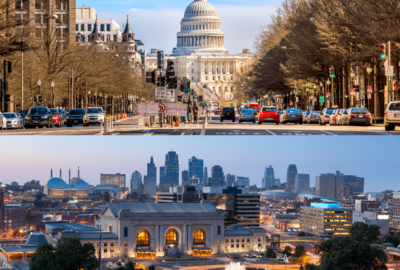
From Oz to Kansas: Worth the trip?
Would you move your family from the suburbs of Washington, D.C., to those of Kansas City to take a lower-wage job — as in $5,000 to $15,000 per annum lower?
Would you move your family from Washington, D.C., suburb of Takoma Park, Maryland, to Overland Park outside Kansas City to take a lower-wage job — as in $5,000 to $15,000 per annum lower?
A GS-11 federal job in Kansas City has a pay range of $62,737 to $81,563, while the same job in the D.C. area pays anywhere from $69,581 to $90,461. The pay gap is even higher as one moves up the career ladder. At Grade 14 D.C.-based employees make $12,000 to $16,000 per year more than their counterparts in Kansas City.
Would you take your kids out of some of the best public schools in the U.S., meaning those in the affluent Maryland and Virginia suburbs of D.C. — knowing that all of your future pay raises will be smaller than if you had stayed in the Washington area?
This year already, higher-paid Washington-area feds got a 2.27% pay increase compared to 1.84% for workers in the same grades doing the same jobs in Kansas City. Since retirement income is based on length of service and salary, over time the switch could translate into a much smaller monthly retirement benefit — for life.
Would you be willing to switch allegiance from the Nationals or the Redskins for the Royals and the Chiefs, knowing it would likely mean a significantly lower lifetime retirement annuity than if you had stayed inside the Beltway?
That’s the choice facing hundreds of D.C.-based employees of the Agriculture and Interior Department. They are step No. 1 in part of the administration’s program to drain the D.C. swamp and get more civil servants closer to the programs they administer and people they serve. About half have already indicated they won’t be going. That’s apparently fine with top political officials here and in Kansas City where many people would be happy to get the work. As one reader in Kansas City, Robert, commented, “Reading the D.C.-based media one gets the impression the [USDA] and Interior moves are a bad thing. On the contrary, bring them on. We have very bright people who can fill them and are closer to both customer bases. And please encourage people in those jobs in D.C. to stay put. I’m sure they will come up with something.”
Last week Agriculture the the American Federation of Government Employees reached a deal designed to make the transition a little more attractive for those who will be heading west. In addition to being allowed to telework through the end of this year, workers who transfer and stay in their jobs for at least six months will be given the equivalent of one month’s pay.
The agreement covers Agriculture Department employees of the Economic Research Service and the National Institute of Food and Agriculture. AFGE President J. David Cox said “this forced relocation is bad for employees, bad for the agricultural community, and bad for taxpayers,” but the union would represent workers regardless of where they work.
Agriculture is reportedly still looking for an actual location for the new workers. That should delight merchants and politicians in both Kansas and Missouri. According to studies related to the Base Realignment and Closure process at the Defense Department, each federal job coming into a community generates six non-federal jobs in whole or in part. D.C., with 15% of the nonpostal federal workforce, is headquarters for most federal agencies. But there are many smaller communities in Oklahoma, Alabama, Utah, New Mexico, Alaska, North and South Carolina; Illinois and Pennsylvania where Uncle Sam is the economic driver.
To compare federal pay in Kansas City versus the Washington-Baltimore area on the Office of Personnel Management’s website.
Nearly Useless Factoid
By Amelia Brust
In 2017 the Japanese corn snack Umaibou used the actor Nicholas Cage’s likeness on the packaging as promotion for that country’s release of Cage’s film “Army of One.” But Cage later said he had never authorized his image for the “Deluxe Umaibou Nicolastick.”
Source: Kotaku
Copyright © 2025 Federal News Network. All rights reserved. This website is not intended for users located within the European Economic Area.
Mike Causey is senior correspondent for Federal News Network and writes his daily Federal Report column on federal employees’ pay, benefits and retirement.
Follow @mcauseyWFED




